2018年高考英语二轮复习专题——动词的时态和语态
文档属性
| 名称 | 2018年高考英语二轮复习专题——动词的时态和语态 |

|
|
| 格式 | zip | ||
| 文件大小 | 247.9KB | ||
| 资源类型 | 教案 | ||
| 版本资源 | 外研版 | ||
| 科目 | 英语 | ||
| 更新时间 | 2017-12-31 00:00:00 | ||
图片预览


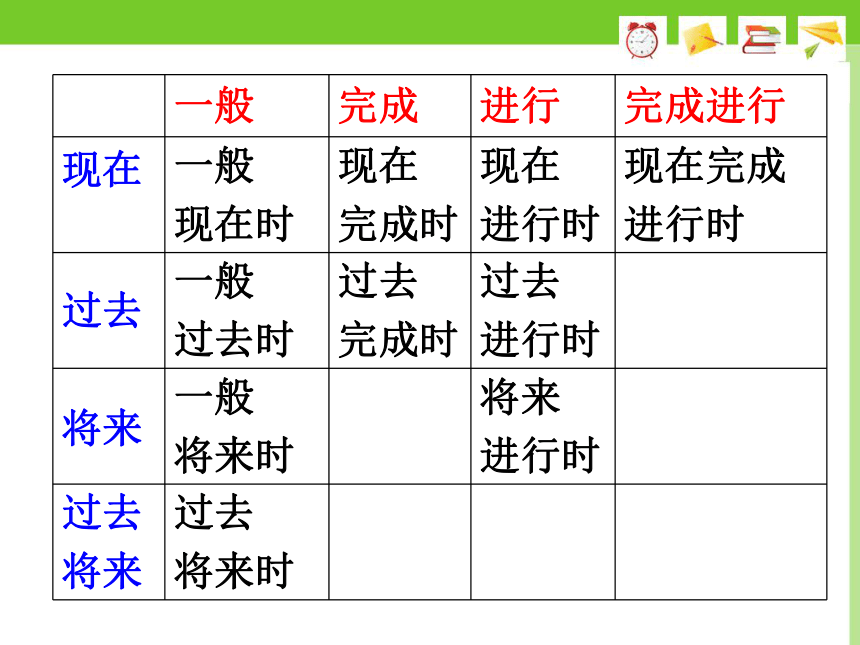
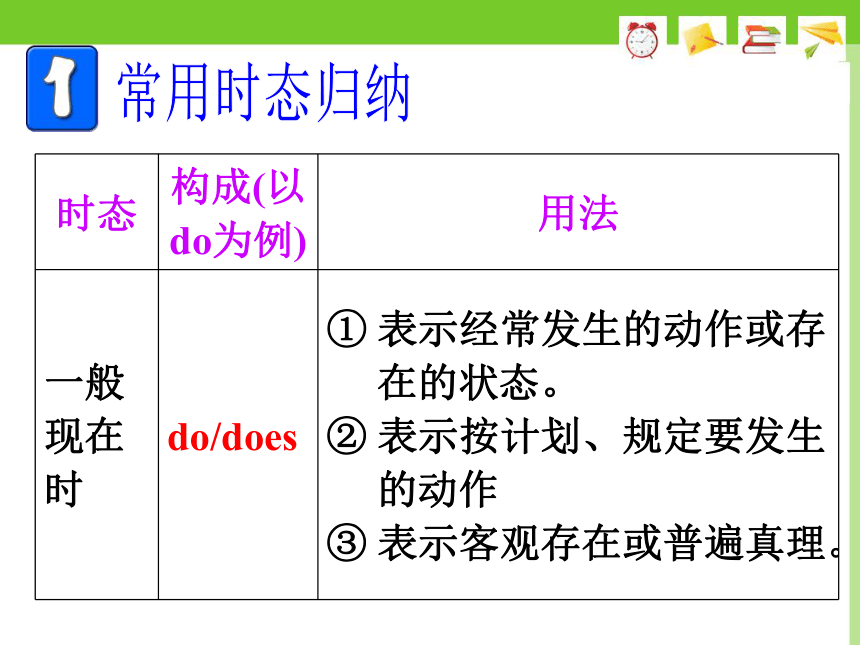
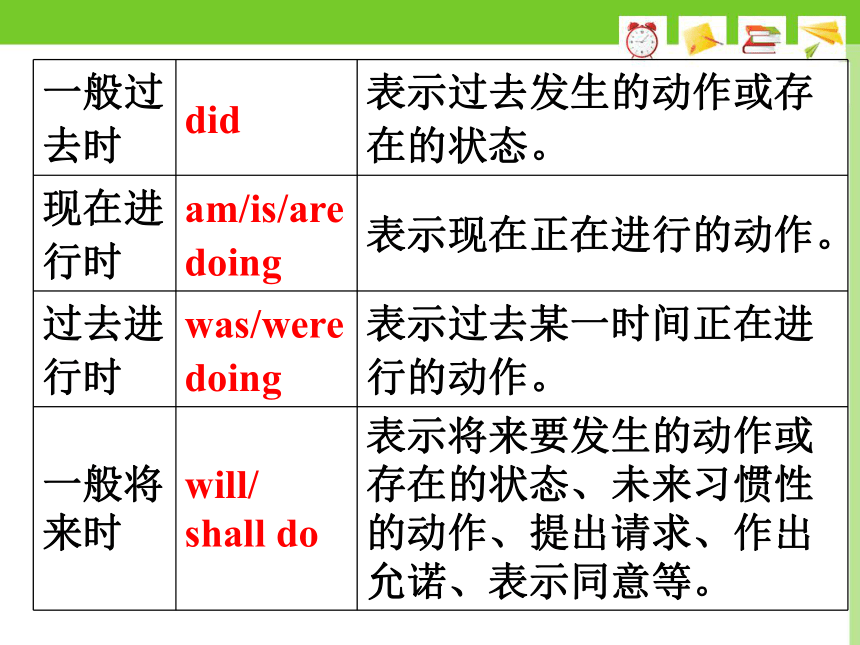
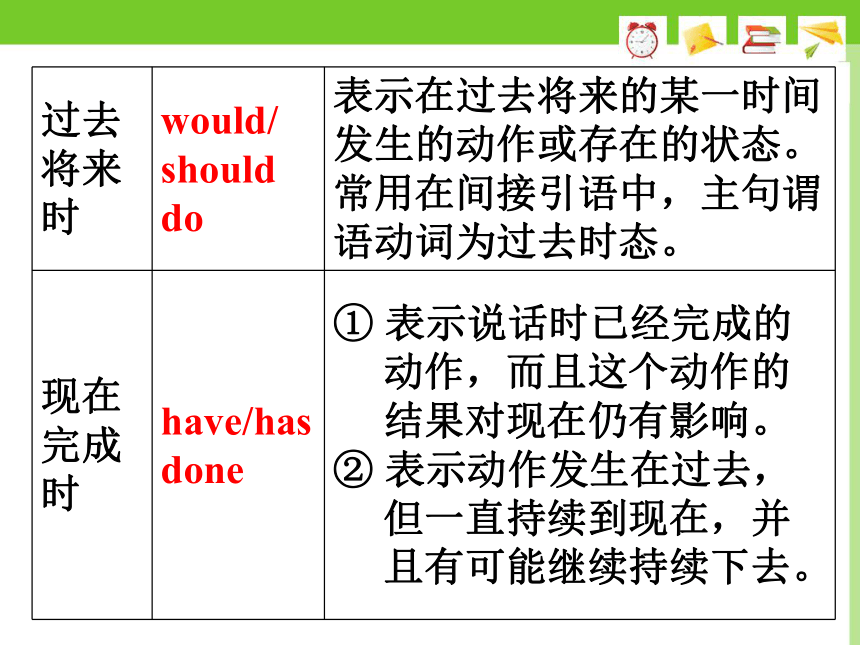
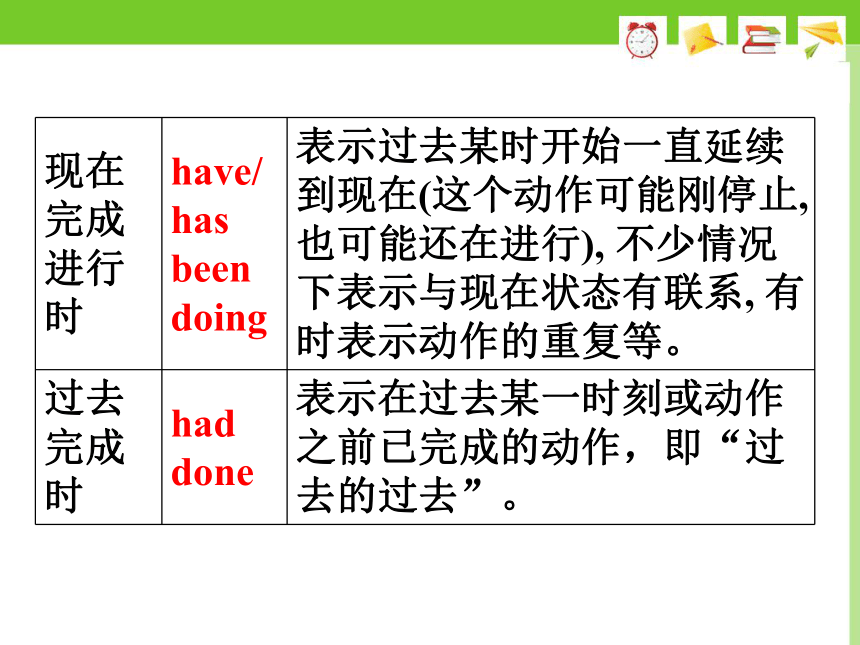
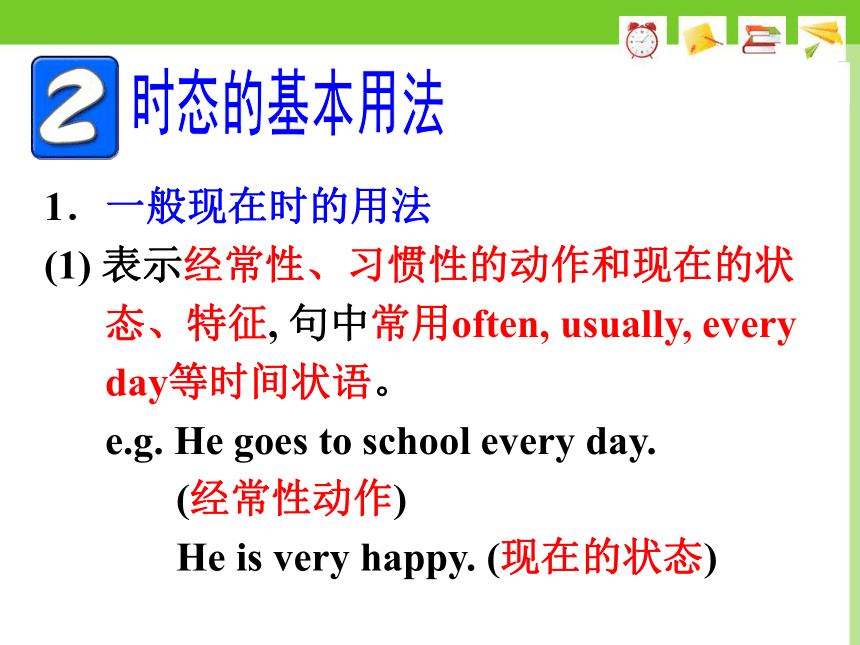
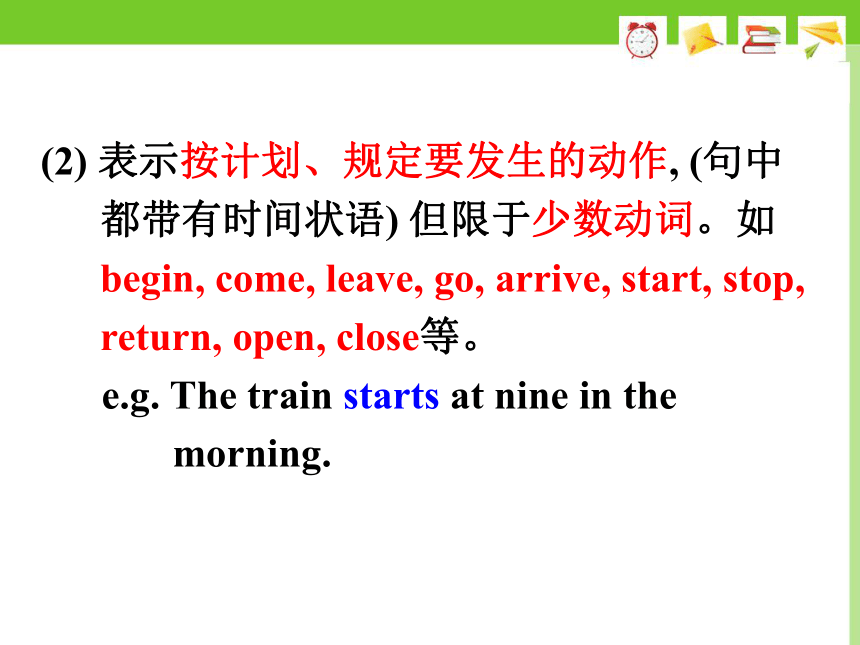
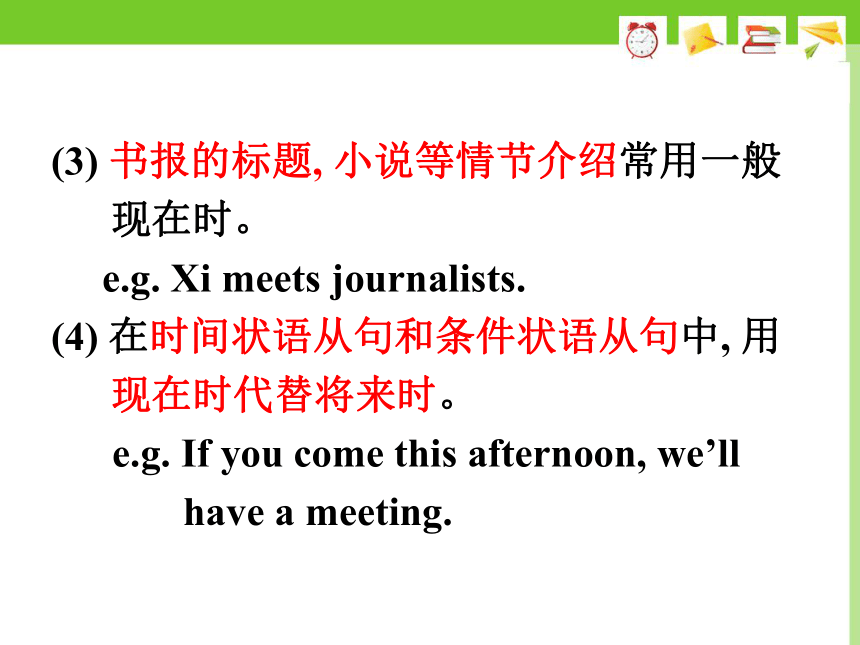
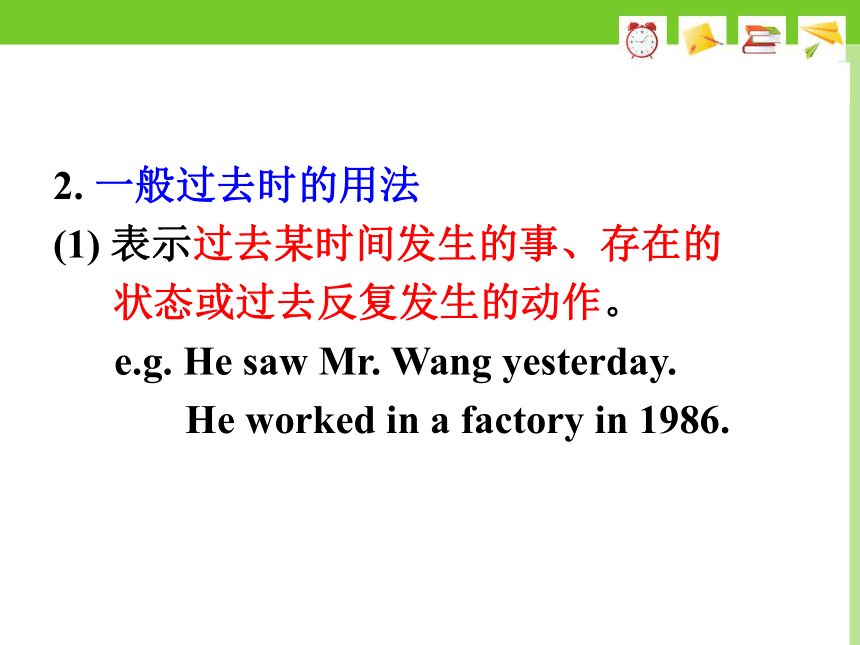
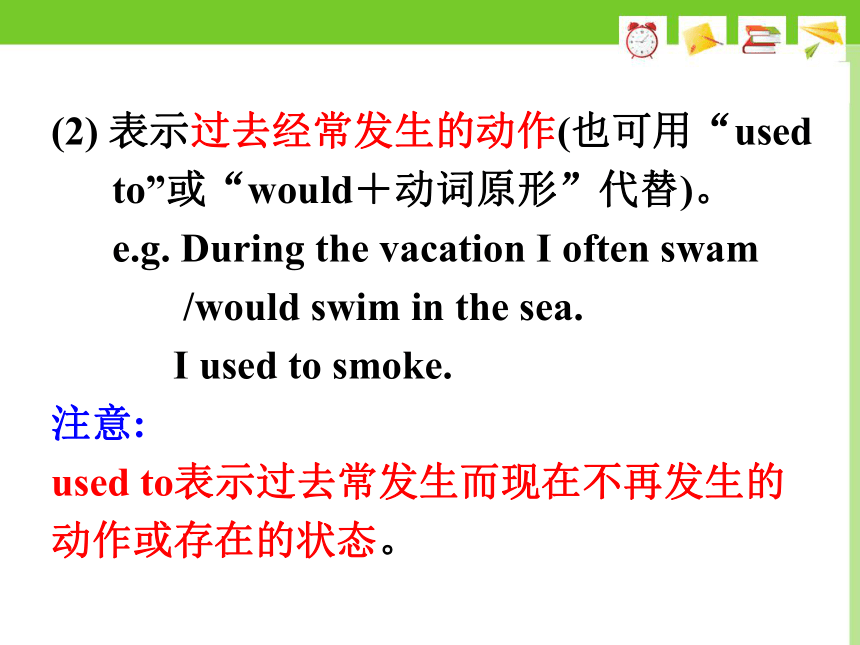
文档简介
(共88张PPT)
时态是用以表示各种时间和动作方面的动词形式。
时间有四个主要部分,即现在、过去、将来和过去将来;
动作方面也有四种,即一般、完成、进行、完成进行。将这些时间和动作方面组合在一起,即构成16种时态。《普通高中英语课程标准(实验)》要求掌握的时态如下表:
一般 完成 进行 完成进行
现在
一般
现在时 现在
完成时 现在
进行时 现在完成
进行时
过去 一般
过去时 过去
完成时 过去
进行时
将来 一般
将来时 将来
进行时
过去
将来 过去
将来时
时态 构成(以do为例) 用法
一般现在时 do/does ① 表示经常发生的动作或存在的状态。
② 表示按计划、规定要发生的动作
③ 表示客观存在或普遍真理。
一般过去时 did 表示过去发生的动作或存在的状态。
现在进行时 am/is/are doing 表示现在正在进行的动作。
过去进行时 was/were doing 表示过去某一时间正在进行的动作。
一般将来时 will/
shall do 表示将来要发生的动作或存在的状态、未来习惯性的动作、提出请求、作出允诺、表示同意等。
过去将来时 would/ should do 表示在过去将来的某一时间发生的动作或存在的状态。常用在间接引语中,主句谓语动词为过去时态。
现在完成时 have/has done ① 表示说话时已经完成的动作,而且这个动作的结果对现在仍有影响。
② 表示动作发生在过去,但一直持续到现在,并且有可能继续持续下去。
现在完成进行时 have/
has been doing 表示过去某时开始一直延续到现在(这个动作可能刚停止, 也可能还在进行), 不少情况下表示与现在状态有联系, 有时表示动作的重复等。
过去完成时 had done 表示在过去某一时刻或动作之前已完成的动作,即“过去的过去”。
1.一般现在时的用法
(1) 表示经常性、习惯性的动作和现在的状
态、特征, 句中常用often, usually, every
day等时间状语。
e.g. He goes to school every day.
(经常性动作)
He is very happy. (现在的状态)
(2) 表示按计划、规定要发生的动作, (句中都带有时间状语) 但限于少数动词。如begin, come, leave, go, arrive, start, stop, return, open, close等。
e.g. The train starts at nine in the
morning.
(3) 书报的标题, 小说等情节介绍常用一般现在时。
e.g. Xi meets journalists.
(4) 在时间状语从句和条件状语从句中, 用现在时代替将来时。
e.g. If you come this afternoon, we’ll
have a meeting.
2. 一般过去时的用法
(1) 表示过去某时间发生的事、存在的状态或过去反复发生的动作。
e.g. He saw Mr. Wang yesterday.
He worked in a factory in 1986.
(2) 表示过去经常发生的动作(也可用“used
to”或“would+动词原形”代替)。
e.g. During the vacation I often swam
/would swim in the sea.
I used to smoke.
注意:
used to表示过去常发生而现在不再发生的
动作或存在的状态。
3. 一般将来时的用法
一般将来时表示将来的动作或状态, 其表达形式除了“will或shall+动词原形”外, 还有以下几种。
(1) “be going to+动词原形”, 表示即将发生的或最近打算进行的事。
e.g. It is going to rain.
We are going to have a meeting today.
(2) go, come, start, move, sail, leave等可用
进行时态表示按计划即将发生的动作。
e.g. I’m coming.
(3) “be to+动词原形”表示按计划要发生
的事或征求对方意见, 也可以表示命令、禁止等。
e.g. Are we to go on with this work
(4) “be about to+动词原形”表示即将发生
的动作。
e.g. The plane is about to leave.
(5) 某些表示位移、停留等的动词其现在
进行时可表示按计划或不久之后肯定
发生的动作或将要做的事。这类动词
有go, come, stay, leave, start等。
4. 现在进行时的用法
(1) 表示此时此刻正在进行的动作, 由“be+现在分词”构成。
e.g. What are you doing?
(2) 与always, constantly等连用, 表示感
彩。
e.g. He is always helping others.
另外“系动词+介词或副词”也表示进行时的意义。
e.g. The bridge is under construction.
注意:下列动词不宜用进行时
① 感觉类:look, smell, feel, sound, taste, see,
hear等;
② 感情类:like, love, prefer, admire, hate,
fear等;
③ 所有类:have, contain, own, hold, belong
to等。
5. 过去进行时的用法
(1) 表示过去某一时刻、某一阶段正进行的动
作, 由“was (were)+现在分词”构成。
e.g. He was reading a novel when I came in.
(2) 与always, forever, constantly连用, 表示赞
成或厌恶的感彩。
e.g. He was always thinking of others,
never thinking of himself.
6. 现在完成时的用法
现在完成时由“have+过去分词”构成。其
使用有两种情况:
(1) 表示的动作在说话之前已完成, 而对现在有影响, 句中没有具体时间状语。
e.g. He has gone to Fuzhou.
(说话人认为他不在此地)
He has been to Fuzhou.
(说话人认为他在此地)
(2) 现在完成时所表示的动作开始于过去, 持
续到现在, 也许还会持续下去。常与for...
和since...等表示一段时间的状语或so far
等表示包括现在时间在内的状语连用。
e.g. He has studied English for 5 years.
He has studied English since 1985.
注意: 表示短暂时间动作的词, 如come, go, die, marry, buy等的完成时不能与for, since等表示一段时间的词连用。
(3) 还可用在时间和条件状语从句中, 表示将来某时完成的动作, 强调此动作先于主句动作发生。
e.g. I’ll go to your home when I have
finished my homework.
Don’t get off the bus until it has
stopped.
7. 过去完成时的用法
(1) 表示过去某一时刻或某一动作之前完成
的动作或状态。句中常用by, before, until, when等词引导的时间状语。
e.g. By the time he was twelve, Edison
had begun to make a living by
himself.
I had learnt 5000 words before I
entered the university.
(2) 表示过去某一时刻之前发生的动作或
状态持续到过去某个时间或持续下去。
e.g. Before he slept, he had worked for
12 hours.
8. 过去将来时的用法
表示从过去的某时间看来将要发生的动作或存在的状态。由“should或would+动词原形”构成。第一人称用should, 其他人称用would。
e.g. They were sure that they would
succeed.
时态的比较
1. 一般过去时与现在完成时
一般过去时只表示过去的动作或状态,不
涉及对现在的影响;现在完成时表示过去发生的某一动作或存在的状态对现在造成的影响或结果,强调的是现在的状况。
e.g. We talked for hours on the phone.
The ship has sailed for two weeks.
一般过去时和表示过去的时间状语连用;
现在完成时常和包括“现在时刻”在内的时间
状语或笼统地表示过去的时间状语连用。
e.g. The flight lasted ten hours and we landed at 6:30 in the morning.
I have been there only once this year.
I have seen his name in the papers rather often recently.
2. 过去完成时与一般过去时
过去完成时以过去某时间为起点,表示过
去某一时间或动作之前已经发生或完成的动作或存在的状态;一般过去时以现在时间为起点,表示过去发生的动作或存在的状态。
e.g. Luke told me that he had met my
friends the day before.
She was here a minute ago.
表示某事继续到过去某时已有一段时间时,用过去完成时;表示两个或两个以上的动
作,且按照动作发生的顺序表达时,用一般过去时。
e.g. My uncle had served in the army for ten
years; last year he retired.
The scientist had a quick lunch and then
continued his work.
3. 现在完成时与现在完成进行时
1) 这两个时态的主要差别是现在完成时表示动作已完成,而现在完成进行时却不一定如此。
e.g. They’ve built a bridge. (已建好)
They've been building a bridge.
(可能还在建)
2) 许多静态动词只能用于现在完成时而不能用于现在完成进行时。
e.g. The strike has lasted six months.
3) 少数动词用这两种时态时意义差别不大。
e.g. He has worked / has been working on
Mrs. Green's case for almost six
years.
时态的呼应
某些从句(特别是宾语从句)中的动词时态常受主句谓语时态的制约,这就称为时态的呼应。如果主句谓语为现在时或将来时,从句中的谓语可以不受影响。
e.g. It's reported that they are building a
new railway.
Will you tell me how you two are getting
along
如果主句谓语为过去时,从句谓语一般要
跟着改为相关的过去时。具体如下:
1. 如从句谓语动作与主句谓语动作同时发生,从句谓语用一般过去时或过去进行时。
e.g. They could not understand why he
spent so much money on clothes.
The professor said that the students
were having an exam.
2. 如从句谓语动作发生在主句谓语动作之前,从句谓语用过去完成时或过去完成进行时。但当从句中有特定的过去时间状语时,从句用一般过去时。
e.g. She told me that she had been offered
a very well-paid position.
I learned from others that Mr. Smith
had been working in our university
since 1978.
He told me that he was born in1983.
3. 如从句谓语动作发生在主句谓语动作之
后,从句谓语用过去将来时、过去将来进行时或过去将来完成时。
e.g. I thought the roses would come out
soon.
注意:在某些情况下,从句谓语不随主句谓
语变化:
1. 从句说明的是普遍真理、客观事实或现在看来仍然真实的情况。
e.g. The teacher said the polar ice melts
each summer.
2. 在口语中为了避免误会。
e.g. He told me he works in the editorial
office.
英语的语态分为主动语态和被动语态。主动语态表示主语是动作的执行者, 被动语态表示主语是动作的承受者。
只有及物动词或含及物意义的短语动词才能转换成被动语态。
一、被动语态的用法:
当我们不知道谁是动作的执行者,或者没有必要指出谁是动作的执行者,或者只需强调动作的承受者时,要用被动语态。
e.g. Such books are written for middle school
students.
English is spoken in many countries.
二、被动语态的构成:
被动语态是由“助动词be +及物动词的过去分词”构成,be随主语的人称、数和时态的变化而变化。被动语态可以用于各种时态。
1. 几种形式的被动语态
一般现在时:
am/is/are +及物动词的过去分词
一般过去时:
was/were +及物动词的过去分词
一般将来时:
shall/will/ be going to + be +及物动词的过去分词
一般过去将来时:
should/would be +及物动词的过去分词
现在进行时:
am/is/are being +及物动词的过去分词
过去进行时:
was/were being +及物动词的过去分词
现在完成时:
has/have been +及物动词的过去分词
过去完成时:
had been +及物动词的过去分词
将来完成时:
shall/will have been +及物动词的过去分词
过去将来完成时:
should/would have been +及物动词的过去分词
2. 特殊结构的被动形式
(1) 双宾动词的被动结构
双宾动词变为被动结构时, 一般将主动结构中的间接宾语变为被动结构中的主语, 直接宾语不变。如将主动结构中的直接宾语变为被动结构中的主语, 间接宾语之前则应加介词to或for。
e.g. He gave her some money.
She was given some money.
Some money was given to him.
(2) 带复合宾语的动词的被动结构
带复合宾语的动词变被动语态时, 一般将主动结构中的宾语变为被动结构中的主语, 而将宾语补足语保留不动(这时的宾语补足语为主语补足语)。
e.g. His father called him Jack. He was called Jack by his father.
(3) 带情态动词的被动语态,由“情态动词
+be+及物动词的过去分词”构成。
e.g. The problem may be solved in a
number of different ways.
In our school, library books must be
returned in two weeks.
(4)“be+过去分词+不定式”式的被动结构
e.g. He is reported to have broken a world
record.
She is said to know three languages.
(5) “it+be+过去分词+从句”式的被动结构 e.g. It’s said that she has some supernatural
powers.
It’s reported that they have discovered a
new star.
常见的结构还有:
It is known that... 众所周知
It is suggested that... 有人建议
It is believed that... 人们相信
(6) “get+done”构成被动语态
此种形式用来表示状态或情况, 常考的形式如下:
get married 结婚;get engaged 订婚;
get hurt/wounded 受伤;get lost 迷路;
get drunk 喝醉了;
get caught/stuck/trapped 被困;
get dressed 穿好衣服;
get run over 被(车)轧等。
3. 主动形式表示被动意义
1) 有些不及物动词的主动形式可以表示被动意义,常见的有下面几种:
a. 某些连系动词,如feel, look, prove,
smell, sound, taste 等。
e.g. The food tasted better than it looked.
b. 某些与can’t, won’t 等连用的不及物动
词,如move, lock, shut, open等。
e.g. It can't move.
The door won't shut.
c. 某些可与well, easily 等副词连用的不及物动词,如read, write, wash 等。
e.g. My new pen writes well.
The cloth doesn't wash easily.
2) 非谓语动词的某些主动形式表示被动意义
a. 在“be + 形容词+ 不定式”结构中,不定式表示的动作与句子主语之间是逻辑上的动宾关系时,用主动形式表示被动意义。用于此结构的常见形容词有:cheap, easy, comfortable, difficult, hard, light, heavy, expensive, pleasant, interesting, fit 等。
e.g. The question is difficult to answer.
Volleyball is very interesting to watch.
b. 在be worth doing 和be to blame 结构中,动词-ing 形式或动词不定式用主动形式表示被动意义。
e.g. The film is well worth seeing.
The policy is partly to blame for
causing the worst unemployment in
Europe.
c. 当want, need, require 表示“需要”时,其宾语可用动词-ing 形式的主动形式表示被动意义。
e.g. The carpet really wants cleaning (= to
be cleaned).
Most house plants require watering (=
to be watered).
4. 不能用于被动语态的情况
★谓语是及物动词leave, enter, reach, suit,
benefit, lack等。
★谓语是不可拆开的take place, consist of,
lose heart, belong to等短语动词。
★宾语是无实意的代词it。
★宾语是表示身体的某一部分的名词。
★宾语是某些抽象名词。
★have不论在什么情况下都不能用于被动语
态。
★一般来说,当动词的宾语是动词-ing形式或者是不定式时不能变成被动语态。
★将来进行时和完成进行时没有被动语态。如果遇到这种情况时,可以用一般将来时和现在完成时的被动语态来代替。
用括号内动词的正确形式填空。
1. So it was a great honour to be invited backstage at the not-for-profit Panda Base, where ticket money helps pay for research. I 62. ____________ (allow) to get up close to these cute animals at the 600-acre centre. (2016新课标全国卷I)
was allowed
2. Truly elegant chopsticks might 62. ________ (make) of gold and silver with Chinese characters. (2016新课标全国卷III)
3. The giant panda 61. ________ (love) by people throughout the world. (四川2016)
4. I ___________ (read) half of the English novel, and I'll try to finish it at the weekend. (北京2016)
be made
is loved
have read
1. Jack _____ in the lab when the power
cut occurred. (2016北京)
A. works B. has worked
C. was working D. would work
解析:when the power cut occurred表示过去的某个时间点,恰在那时发生的动作要用过去进行时,“停电时Jack正在实验室工作”。
C
2. When walking down the street, I came
across David, when I _____ for years.
(2016天津)
A. didn’t see B. haven’t seen
C. hadn’t seen D. wouldn’t see
解析: came across是一般过去时,在此之前我和David好多年没见面了,“过去的过去”,所以要用过去完成时。
C
3. Dashan, who _____ crosstalk, the Chinese
comedic tradition, for decades, wants to
mix it up with the Western stand-up
tradition. (2016江苏) A. will be learning B. is learning
C. had been learning D. has been learning
解析:根据时间状语for decades和wants判断出这个动作已经持续了很长时间且一直到现在,所以要用现在完成进行时。
D
4. More efforts, as reported, ______ in the years ahead to accelerate the supply-side structural reform. (2016江苏)
A. are made B. will be made
C. are being made D. have been made
解析:根据时间状语in the years表明是将来时,因为in+时间段常与一般将来时连用;且to accelerate不定式常表示将来会达到何种目的,且努力是被人做出的,所以要用将来时的被动语态。
B
5. The students have been working hard on their lessons and their efforts______ success in the end. (2016北京) A. rewarded B. were rewarded
C. will reward D. will be rewarded
解析:通过have been working hard判断出从过去开始到现在学生们一直很努力学习,那么得到回报应该是将来的事,而努力是被回报,所以要用将来时的被动语态。
D
I. 选用括号内合适的内容填空。
A
1. —Look! It _________ (snows / is snowing).
—It 's beautiful! This is the first time I 've ever seen snow.
2. While I _________ (was sitting / am sitting) in a meeting, my mobile suddenly rang.
3. He will stop showing off, if no notice ________ (takes / is taken) of him.
is snowing
was sitting
is taken
4. Every morning, the sun ________ (shines / is shining) in my bedroom window and ________ (is waken / wakes) me up.
5. The dumplings were so delicious that they ________ (were sold / are sold) in no time.
6. When he ________ (founded/ had founded) Microsoft, Bill Gates was only 20years old. He _________________ (has already written / had already written) his first computer programme six years earlier.
shines
wakes
were sold
founded
had already written
B
Interviewer: Jane, how long have you been learning English
Jane: I 1. __________________ (learn / have been learning) English for six years. It's one of my favourite subjects.
Interviewer: What other subjects do you like
Jane: I also 2. ________ (love/ loved) art and physical education.
have been learning
love
Interviewer: How often do you do sports per week
Jane: I go jogging every morning and I have been playing in my school 's basketball team for two years. We 3. ________ (train / are training) three times a week.
train
Interviewer: And what about art Do you paint a lot
Jane: Oh yes, I 4. _________________ (had been painting /have been painting) since I was just two years old.
have been painting
II.根据括号内的汉语提示补全下面句子。
1. She ________________________ ( 定期打排球) for many years when she was young.
2. You must be mistaken about seeing Larry at the theatre; I 'm sure he ___________ _______________ (整个星期都在国外).
3. When Mark opened the door, he saw a woman who he _______________________ (之前从未见过) standing there.
played volleyball regularly
has been
had never seen before
abroad all week
4. They won't buy any new clothes because they __________________ ( 正在攒钱) to buy a new car.
5. We have so many problems to deal with but time __________________ (快用完了).
6. David _____________________ ( 一
直在告诉我们) how to respond to the
things in life that happen to us.
are saving money
is running out
has been telling us
7. When he realized he ________________ ______________ (走进一个深谷), he was too frightened to know what to do.
8. Let 's keep to the point or we __________ ___________________ (永远也达不成协议).
9. Lisa will pass her driving test for she ______________________ (一直在准备) for it for months.
had walked into
will never
has been preparing
a deep valley
reach an agreement
10. I ______________________________ ( 给我妈妈打电话) three times today but her line was always busy.
11. The news came as no surprise to me. I had known for some time that the store _________________________ ( 将要倒闭).
12. You spend too much time playing computer games. You ________________ _____________ ( 在损害你的健康).
had called / phoned my mother
was going to shut down
are damaging
your health
III. 用括号内动词的正确形式填空。
1. My mobile phone was ringing, but by the time I ________ (find) it, it had stopped.
2. All the drivers ______________ (make) to drive more carefully after the new Highway Code takes effect.
3. The moment I got home, I realized I ________ (leave) my purse in the cinema.
4. This mountainous area in my hometown ___________(name) a national wildlife reserve several years ago.
found
will be made
had left
was named
5. During my stay in Beijing, I visited almost all the places of interest my friends __________________ (recommend).
6. Al l the preparations for the trip to
Beijing ___________________ (complete), and we're ready to start off.
7. The thief tried to break away from the policeman who ____________ (hold) him, but failed.
8. The meat didn't taste very good. It ________________ (cook) too long.
had recommended
have been completed
was holding
had been cooked
9. Nowadays visitors ____________ (request) not to take photos in many museums.
10. The reporter said that the UFO ______
________ (travel) from east to west when he saw it.
11. You've failed to do what you ____________ (expect) to again and I 'm afraid your mother will blame you.
12. She came home, switched on the computer and ________ (check) her e-mails.
are requested
was
were expected
checked
travelling
IV. 选用方框内合适的内容填空(每项限用一次)。
1. Jonathon watches the news on TV every day and it ________ him with his English.
2. Mrs. Smith said that one day she would retire from teaching. She said that she _____________ her new free time learning about computers.
helps
sells, helps, is flying, was listening,
am leaving, will arrive, would spend,
had robbed, had been standing
would spend
3. I did not sleep at all last night. Someone ______________ to music all night.
4. The judge sentenced the man to eight years in prison because he ___________ a bank.
5. Unless he ________ more he won't get
much money.
was listening
sells, helps, is flying, was listening,
am leaving, will arrive, would spend,
had robbed, had been standing
had robbed
sells
6. They ________________ in the queue for over an hour when the manager told them that there were no more tickets.
7. M y sister ________ home from London to day. Her flight __________ in an hour so I _____________ for the airport right now to get there in time.
had been standing
sells, helps, is flying, was listening,
am leaving, will arrive, would spend,
had robbed, had been standing
is flying
will arrive
am leaving
V. 用括号内单词的正确形式完成下面短文。
A
An accident 1. __________ (happen) near my house last night. A car hit a young man. He 2. _____________ (ride) his bike when someone in front of him suddenly 3. ________ (open) a car door. Many people4. ________ (see) the accident.
happened
was riding
opened
saw
B
This building, which is the oldest surviving
example in the country, is said to be the most
expensive house in Canada. Currently the house 1. ____________ (sell) by the international company, McPhersons. The house 2. __________ (report) to be haunted ( 闹鬼的) and many people down t he centuries 3. __________ (hear) strange footsteps and noises in the dark of night.
is being sold
is reported
have heard
The building 4. ________ (build) in 1123 by Michel Davidson, and it 5. ________ (have) an unusual history ever since then. Many famous people are said to have stayed in the house on many occasions including Oliver Cromwel1. Henry Reede 6. _______________________ (live) in the house for the past ten years. While the house 7. __________________ (repair) some years ago, Mr. Reede conducted some research into the history of the house.
was built
has had
has been living / has lived
was being repaired
“I 8. __________ (read) that there are secret rooms somewhere,”he said.“We9. ________________ (look) for them for quite some time now but 10. ______________ (find, not) them. However, we do hope to find them some day. ”
have read
have been looking
haven't found
C
I have always wanted to become an actress. I have often acted in school drama productions and with the drama group in our town. I have already written my own scripts and in 2014I 1. ________ (win ) the“ Young Actors' Award”. My parents 2. ____________ (tolerate) this interest as a hobby, but they have never taken it seriously.
won
have tolerated
Last year my parents 3. ____________ (persuade) me to stay on at school to do A levels. I have already told them that I want to go to drama school, but they say it 's a dead-end job with very uncertain prospects ( 前途). They want me to study law. I'm a creative person —law would be the worst thing I can imagine.
persuaded
We 4. ____________ (speak) a lot about my future recently, but they haven 't changed their views. They have had no reason to be angry with me. So far I 5. ___________ (do) reasonably well in school. Up to now my marks 6. __________ (be) average or even better. My marks in English have always been very good.
have spoken
have done
have been
Two months ago I 7. ________ (apply) for a
place at RADA (Royal Academy of Dramatic Art in London). I didn't tell my parents. Last week I 8.________ (receive) a reply inviting me to go down for an interview. I have considered leaving home if I 9. ___________ (offer) a place. The troubles, it would cost a lot of money and my parents 10. __________ (give, not) it to me. How could I possibly support myself
applied
received
am offered
wouldn't give
I 11. _____________ (have, just) a serious argument with my parents, although I have never really quarrelled with them in my life before. Yesterday my friend 12. ______ (say): “Have you ever done anything that your parents didn't want Because if you haven't, now is the time.” But I haven't had my18th birthday yet.
have just had
said
I think I 13. ________ (be) afraid of the future, but I have not made up my mind yet about leaving home. My parents want
what's best or me —but do they really know
what that is What shall I do
am
时态是用以表示各种时间和动作方面的动词形式。
时间有四个主要部分,即现在、过去、将来和过去将来;
动作方面也有四种,即一般、完成、进行、完成进行。将这些时间和动作方面组合在一起,即构成16种时态。《普通高中英语课程标准(实验)》要求掌握的时态如下表:
一般 完成 进行 完成进行
现在
一般
现在时 现在
完成时 现在
进行时 现在完成
进行时
过去 一般
过去时 过去
完成时 过去
进行时
将来 一般
将来时 将来
进行时
过去
将来 过去
将来时
时态 构成(以do为例) 用法
一般现在时 do/does ① 表示经常发生的动作或存在的状态。
② 表示按计划、规定要发生的动作
③ 表示客观存在或普遍真理。
一般过去时 did 表示过去发生的动作或存在的状态。
现在进行时 am/is/are doing 表示现在正在进行的动作。
过去进行时 was/were doing 表示过去某一时间正在进行的动作。
一般将来时 will/
shall do 表示将来要发生的动作或存在的状态、未来习惯性的动作、提出请求、作出允诺、表示同意等。
过去将来时 would/ should do 表示在过去将来的某一时间发生的动作或存在的状态。常用在间接引语中,主句谓语动词为过去时态。
现在完成时 have/has done ① 表示说话时已经完成的动作,而且这个动作的结果对现在仍有影响。
② 表示动作发生在过去,但一直持续到现在,并且有可能继续持续下去。
现在完成进行时 have/
has been doing 表示过去某时开始一直延续到现在(这个动作可能刚停止, 也可能还在进行), 不少情况下表示与现在状态有联系, 有时表示动作的重复等。
过去完成时 had done 表示在过去某一时刻或动作之前已完成的动作,即“过去的过去”。
1.一般现在时的用法
(1) 表示经常性、习惯性的动作和现在的状
态、特征, 句中常用often, usually, every
day等时间状语。
e.g. He goes to school every day.
(经常性动作)
He is very happy. (现在的状态)
(2) 表示按计划、规定要发生的动作, (句中都带有时间状语) 但限于少数动词。如begin, come, leave, go, arrive, start, stop, return, open, close等。
e.g. The train starts at nine in the
morning.
(3) 书报的标题, 小说等情节介绍常用一般现在时。
e.g. Xi meets journalists.
(4) 在时间状语从句和条件状语从句中, 用现在时代替将来时。
e.g. If you come this afternoon, we’ll
have a meeting.
2. 一般过去时的用法
(1) 表示过去某时间发生的事、存在的状态或过去反复发生的动作。
e.g. He saw Mr. Wang yesterday.
He worked in a factory in 1986.
(2) 表示过去经常发生的动作(也可用“used
to”或“would+动词原形”代替)。
e.g. During the vacation I often swam
/would swim in the sea.
I used to smoke.
注意:
used to表示过去常发生而现在不再发生的
动作或存在的状态。
3. 一般将来时的用法
一般将来时表示将来的动作或状态, 其表达形式除了“will或shall+动词原形”外, 还有以下几种。
(1) “be going to+动词原形”, 表示即将发生的或最近打算进行的事。
e.g. It is going to rain.
We are going to have a meeting today.
(2) go, come, start, move, sail, leave等可用
进行时态表示按计划即将发生的动作。
e.g. I’m coming.
(3) “be to+动词原形”表示按计划要发生
的事或征求对方意见, 也可以表示命令、禁止等。
e.g. Are we to go on with this work
(4) “be about to+动词原形”表示即将发生
的动作。
e.g. The plane is about to leave.
(5) 某些表示位移、停留等的动词其现在
进行时可表示按计划或不久之后肯定
发生的动作或将要做的事。这类动词
有go, come, stay, leave, start等。
4. 现在进行时的用法
(1) 表示此时此刻正在进行的动作, 由“be+现在分词”构成。
e.g. What are you doing?
(2) 与always, constantly等连用, 表示感
彩。
e.g. He is always helping others.
另外“系动词+介词或副词”也表示进行时的意义。
e.g. The bridge is under construction.
注意:下列动词不宜用进行时
① 感觉类:look, smell, feel, sound, taste, see,
hear等;
② 感情类:like, love, prefer, admire, hate,
fear等;
③ 所有类:have, contain, own, hold, belong
to等。
5. 过去进行时的用法
(1) 表示过去某一时刻、某一阶段正进行的动
作, 由“was (were)+现在分词”构成。
e.g. He was reading a novel when I came in.
(2) 与always, forever, constantly连用, 表示赞
成或厌恶的感彩。
e.g. He was always thinking of others,
never thinking of himself.
6. 现在完成时的用法
现在完成时由“have+过去分词”构成。其
使用有两种情况:
(1) 表示的动作在说话之前已完成, 而对现在有影响, 句中没有具体时间状语。
e.g. He has gone to Fuzhou.
(说话人认为他不在此地)
He has been to Fuzhou.
(说话人认为他在此地)
(2) 现在完成时所表示的动作开始于过去, 持
续到现在, 也许还会持续下去。常与for...
和since...等表示一段时间的状语或so far
等表示包括现在时间在内的状语连用。
e.g. He has studied English for 5 years.
He has studied English since 1985.
注意: 表示短暂时间动作的词, 如come, go, die, marry, buy等的完成时不能与for, since等表示一段时间的词连用。
(3) 还可用在时间和条件状语从句中, 表示将来某时完成的动作, 强调此动作先于主句动作发生。
e.g. I’ll go to your home when I have
finished my homework.
Don’t get off the bus until it has
stopped.
7. 过去完成时的用法
(1) 表示过去某一时刻或某一动作之前完成
的动作或状态。句中常用by, before, until, when等词引导的时间状语。
e.g. By the time he was twelve, Edison
had begun to make a living by
himself.
I had learnt 5000 words before I
entered the university.
(2) 表示过去某一时刻之前发生的动作或
状态持续到过去某个时间或持续下去。
e.g. Before he slept, he had worked for
12 hours.
8. 过去将来时的用法
表示从过去的某时间看来将要发生的动作或存在的状态。由“should或would+动词原形”构成。第一人称用should, 其他人称用would。
e.g. They were sure that they would
succeed.
时态的比较
1. 一般过去时与现在完成时
一般过去时只表示过去的动作或状态,不
涉及对现在的影响;现在完成时表示过去发生的某一动作或存在的状态对现在造成的影响或结果,强调的是现在的状况。
e.g. We talked for hours on the phone.
The ship has sailed for two weeks.
一般过去时和表示过去的时间状语连用;
现在完成时常和包括“现在时刻”在内的时间
状语或笼统地表示过去的时间状语连用。
e.g. The flight lasted ten hours and we landed at 6:30 in the morning.
I have been there only once this year.
I have seen his name in the papers rather often recently.
2. 过去完成时与一般过去时
过去完成时以过去某时间为起点,表示过
去某一时间或动作之前已经发生或完成的动作或存在的状态;一般过去时以现在时间为起点,表示过去发生的动作或存在的状态。
e.g. Luke told me that he had met my
friends the day before.
She was here a minute ago.
表示某事继续到过去某时已有一段时间时,用过去完成时;表示两个或两个以上的动
作,且按照动作发生的顺序表达时,用一般过去时。
e.g. My uncle had served in the army for ten
years; last year he retired.
The scientist had a quick lunch and then
continued his work.
3. 现在完成时与现在完成进行时
1) 这两个时态的主要差别是现在完成时表示动作已完成,而现在完成进行时却不一定如此。
e.g. They’ve built a bridge. (已建好)
They've been building a bridge.
(可能还在建)
2) 许多静态动词只能用于现在完成时而不能用于现在完成进行时。
e.g. The strike has lasted six months.
3) 少数动词用这两种时态时意义差别不大。
e.g. He has worked / has been working on
Mrs. Green's case for almost six
years.
时态的呼应
某些从句(特别是宾语从句)中的动词时态常受主句谓语时态的制约,这就称为时态的呼应。如果主句谓语为现在时或将来时,从句中的谓语可以不受影响。
e.g. It's reported that they are building a
new railway.
Will you tell me how you two are getting
along
如果主句谓语为过去时,从句谓语一般要
跟着改为相关的过去时。具体如下:
1. 如从句谓语动作与主句谓语动作同时发生,从句谓语用一般过去时或过去进行时。
e.g. They could not understand why he
spent so much money on clothes.
The professor said that the students
were having an exam.
2. 如从句谓语动作发生在主句谓语动作之前,从句谓语用过去完成时或过去完成进行时。但当从句中有特定的过去时间状语时,从句用一般过去时。
e.g. She told me that she had been offered
a very well-paid position.
I learned from others that Mr. Smith
had been working in our university
since 1978.
He told me that he was born in1983.
3. 如从句谓语动作发生在主句谓语动作之
后,从句谓语用过去将来时、过去将来进行时或过去将来完成时。
e.g. I thought the roses would come out
soon.
注意:在某些情况下,从句谓语不随主句谓
语变化:
1. 从句说明的是普遍真理、客观事实或现在看来仍然真实的情况。
e.g. The teacher said the polar ice melts
each summer.
2. 在口语中为了避免误会。
e.g. He told me he works in the editorial
office.
英语的语态分为主动语态和被动语态。主动语态表示主语是动作的执行者, 被动语态表示主语是动作的承受者。
只有及物动词或含及物意义的短语动词才能转换成被动语态。
一、被动语态的用法:
当我们不知道谁是动作的执行者,或者没有必要指出谁是动作的执行者,或者只需强调动作的承受者时,要用被动语态。
e.g. Such books are written for middle school
students.
English is spoken in many countries.
二、被动语态的构成:
被动语态是由“助动词be +及物动词的过去分词”构成,be随主语的人称、数和时态的变化而变化。被动语态可以用于各种时态。
1. 几种形式的被动语态
一般现在时:
am/is/are +及物动词的过去分词
一般过去时:
was/were +及物动词的过去分词
一般将来时:
shall/will/ be going to + be +及物动词的过去分词
一般过去将来时:
should/would be +及物动词的过去分词
现在进行时:
am/is/are being +及物动词的过去分词
过去进行时:
was/were being +及物动词的过去分词
现在完成时:
has/have been +及物动词的过去分词
过去完成时:
had been +及物动词的过去分词
将来完成时:
shall/will have been +及物动词的过去分词
过去将来完成时:
should/would have been +及物动词的过去分词
2. 特殊结构的被动形式
(1) 双宾动词的被动结构
双宾动词变为被动结构时, 一般将主动结构中的间接宾语变为被动结构中的主语, 直接宾语不变。如将主动结构中的直接宾语变为被动结构中的主语, 间接宾语之前则应加介词to或for。
e.g. He gave her some money.
She was given some money.
Some money was given to him.
(2) 带复合宾语的动词的被动结构
带复合宾语的动词变被动语态时, 一般将主动结构中的宾语变为被动结构中的主语, 而将宾语补足语保留不动(这时的宾语补足语为主语补足语)。
e.g. His father called him Jack. He was called Jack by his father.
(3) 带情态动词的被动语态,由“情态动词
+be+及物动词的过去分词”构成。
e.g. The problem may be solved in a
number of different ways.
In our school, library books must be
returned in two weeks.
(4)“be+过去分词+不定式”式的被动结构
e.g. He is reported to have broken a world
record.
She is said to know three languages.
(5) “it+be+过去分词+从句”式的被动结构 e.g. It’s said that she has some supernatural
powers.
It’s reported that they have discovered a
new star.
常见的结构还有:
It is known that... 众所周知
It is suggested that... 有人建议
It is believed that... 人们相信
(6) “get+done”构成被动语态
此种形式用来表示状态或情况, 常考的形式如下:
get married 结婚;get engaged 订婚;
get hurt/wounded 受伤;get lost 迷路;
get drunk 喝醉了;
get caught/stuck/trapped 被困;
get dressed 穿好衣服;
get run over 被(车)轧等。
3. 主动形式表示被动意义
1) 有些不及物动词的主动形式可以表示被动意义,常见的有下面几种:
a. 某些连系动词,如feel, look, prove,
smell, sound, taste 等。
e.g. The food tasted better than it looked.
b. 某些与can’t, won’t 等连用的不及物动
词,如move, lock, shut, open等。
e.g. It can't move.
The door won't shut.
c. 某些可与well, easily 等副词连用的不及物动词,如read, write, wash 等。
e.g. My new pen writes well.
The cloth doesn't wash easily.
2) 非谓语动词的某些主动形式表示被动意义
a. 在“be + 形容词+ 不定式”结构中,不定式表示的动作与句子主语之间是逻辑上的动宾关系时,用主动形式表示被动意义。用于此结构的常见形容词有:cheap, easy, comfortable, difficult, hard, light, heavy, expensive, pleasant, interesting, fit 等。
e.g. The question is difficult to answer.
Volleyball is very interesting to watch.
b. 在be worth doing 和be to blame 结构中,动词-ing 形式或动词不定式用主动形式表示被动意义。
e.g. The film is well worth seeing.
The policy is partly to blame for
causing the worst unemployment in
Europe.
c. 当want, need, require 表示“需要”时,其宾语可用动词-ing 形式的主动形式表示被动意义。
e.g. The carpet really wants cleaning (= to
be cleaned).
Most house plants require watering (=
to be watered).
4. 不能用于被动语态的情况
★谓语是及物动词leave, enter, reach, suit,
benefit, lack等。
★谓语是不可拆开的take place, consist of,
lose heart, belong to等短语动词。
★宾语是无实意的代词it。
★宾语是表示身体的某一部分的名词。
★宾语是某些抽象名词。
★have不论在什么情况下都不能用于被动语
态。
★一般来说,当动词的宾语是动词-ing形式或者是不定式时不能变成被动语态。
★将来进行时和完成进行时没有被动语态。如果遇到这种情况时,可以用一般将来时和现在完成时的被动语态来代替。
用括号内动词的正确形式填空。
1. So it was a great honour to be invited backstage at the not-for-profit Panda Base, where ticket money helps pay for research. I 62. ____________ (allow) to get up close to these cute animals at the 600-acre centre. (2016新课标全国卷I)
was allowed
2. Truly elegant chopsticks might 62. ________ (make) of gold and silver with Chinese characters. (2016新课标全国卷III)
3. The giant panda 61. ________ (love) by people throughout the world. (四川2016)
4. I ___________ (read) half of the English novel, and I'll try to finish it at the weekend. (北京2016)
be made
is loved
have read
1. Jack _____ in the lab when the power
cut occurred. (2016北京)
A. works B. has worked
C. was working D. would work
解析:when the power cut occurred表示过去的某个时间点,恰在那时发生的动作要用过去进行时,“停电时Jack正在实验室工作”。
C
2. When walking down the street, I came
across David, when I _____ for years.
(2016天津)
A. didn’t see B. haven’t seen
C. hadn’t seen D. wouldn’t see
解析: came across是一般过去时,在此之前我和David好多年没见面了,“过去的过去”,所以要用过去完成时。
C
3. Dashan, who _____ crosstalk, the Chinese
comedic tradition, for decades, wants to
mix it up with the Western stand-up
tradition. (2016江苏) A. will be learning B. is learning
C. had been learning D. has been learning
解析:根据时间状语for decades和wants判断出这个动作已经持续了很长时间且一直到现在,所以要用现在完成进行时。
D
4. More efforts, as reported, ______ in the years ahead to accelerate the supply-side structural reform. (2016江苏)
A. are made B. will be made
C. are being made D. have been made
解析:根据时间状语in the years表明是将来时,因为in+时间段常与一般将来时连用;且to accelerate不定式常表示将来会达到何种目的,且努力是被人做出的,所以要用将来时的被动语态。
B
5. The students have been working hard on their lessons and their efforts______ success in the end. (2016北京) A. rewarded B. were rewarded
C. will reward D. will be rewarded
解析:通过have been working hard判断出从过去开始到现在学生们一直很努力学习,那么得到回报应该是将来的事,而努力是被回报,所以要用将来时的被动语态。
D
I. 选用括号内合适的内容填空。
A
1. —Look! It _________ (snows / is snowing).
—It 's beautiful! This is the first time I 've ever seen snow.
2. While I _________ (was sitting / am sitting) in a meeting, my mobile suddenly rang.
3. He will stop showing off, if no notice ________ (takes / is taken) of him.
is snowing
was sitting
is taken
4. Every morning, the sun ________ (shines / is shining) in my bedroom window and ________ (is waken / wakes) me up.
5. The dumplings were so delicious that they ________ (were sold / are sold) in no time.
6. When he ________ (founded/ had founded) Microsoft, Bill Gates was only 20years old. He _________________ (has already written / had already written) his first computer programme six years earlier.
shines
wakes
were sold
founded
had already written
B
Interviewer: Jane, how long have you been learning English
Jane: I 1. __________________ (learn / have been learning) English for six years. It's one of my favourite subjects.
Interviewer: What other subjects do you like
Jane: I also 2. ________ (love/ loved) art and physical education.
have been learning
love
Interviewer: How often do you do sports per week
Jane: I go jogging every morning and I have been playing in my school 's basketball team for two years. We 3. ________ (train / are training) three times a week.
train
Interviewer: And what about art Do you paint a lot
Jane: Oh yes, I 4. _________________ (had been painting /have been painting) since I was just two years old.
have been painting
II.根据括号内的汉语提示补全下面句子。
1. She ________________________ ( 定期打排球) for many years when she was young.
2. You must be mistaken about seeing Larry at the theatre; I 'm sure he ___________ _______________ (整个星期都在国外).
3. When Mark opened the door, he saw a woman who he _______________________ (之前从未见过) standing there.
played volleyball regularly
has been
had never seen before
abroad all week
4. They won't buy any new clothes because they __________________ ( 正在攒钱) to buy a new car.
5. We have so many problems to deal with but time __________________ (快用完了).
6. David _____________________ ( 一
直在告诉我们) how to respond to the
things in life that happen to us.
are saving money
is running out
has been telling us
7. When he realized he ________________ ______________ (走进一个深谷), he was too frightened to know what to do.
8. Let 's keep to the point or we __________ ___________________ (永远也达不成协议).
9. Lisa will pass her driving test for she ______________________ (一直在准备) for it for months.
had walked into
will never
has been preparing
a deep valley
reach an agreement
10. I ______________________________ ( 给我妈妈打电话) three times today but her line was always busy.
11. The news came as no surprise to me. I had known for some time that the store _________________________ ( 将要倒闭).
12. You spend too much time playing computer games. You ________________ _____________ ( 在损害你的健康).
had called / phoned my mother
was going to shut down
are damaging
your health
III. 用括号内动词的正确形式填空。
1. My mobile phone was ringing, but by the time I ________ (find) it, it had stopped.
2. All the drivers ______________ (make) to drive more carefully after the new Highway Code takes effect.
3. The moment I got home, I realized I ________ (leave) my purse in the cinema.
4. This mountainous area in my hometown ___________(name) a national wildlife reserve several years ago.
found
will be made
had left
was named
5. During my stay in Beijing, I visited almost all the places of interest my friends __________________ (recommend).
6. Al l the preparations for the trip to
Beijing ___________________ (complete), and we're ready to start off.
7. The thief tried to break away from the policeman who ____________ (hold) him, but failed.
8. The meat didn't taste very good. It ________________ (cook) too long.
had recommended
have been completed
was holding
had been cooked
9. Nowadays visitors ____________ (request) not to take photos in many museums.
10. The reporter said that the UFO ______
________ (travel) from east to west when he saw it.
11. You've failed to do what you ____________ (expect) to again and I 'm afraid your mother will blame you.
12. She came home, switched on the computer and ________ (check) her e-mails.
are requested
was
were expected
checked
travelling
IV. 选用方框内合适的内容填空(每项限用一次)。
1. Jonathon watches the news on TV every day and it ________ him with his English.
2. Mrs. Smith said that one day she would retire from teaching. She said that she _____________ her new free time learning about computers.
helps
sells, helps, is flying, was listening,
am leaving, will arrive, would spend,
had robbed, had been standing
would spend
3. I did not sleep at all last night. Someone ______________ to music all night.
4. The judge sentenced the man to eight years in prison because he ___________ a bank.
5. Unless he ________ more he won't get
much money.
was listening
sells, helps, is flying, was listening,
am leaving, will arrive, would spend,
had robbed, had been standing
had robbed
sells
6. They ________________ in the queue for over an hour when the manager told them that there were no more tickets.
7. M y sister ________ home from London to day. Her flight __________ in an hour so I _____________ for the airport right now to get there in time.
had been standing
sells, helps, is flying, was listening,
am leaving, will arrive, would spend,
had robbed, had been standing
is flying
will arrive
am leaving
V. 用括号内单词的正确形式完成下面短文。
A
An accident 1. __________ (happen) near my house last night. A car hit a young man. He 2. _____________ (ride) his bike when someone in front of him suddenly 3. ________ (open) a car door. Many people4. ________ (see) the accident.
happened
was riding
opened
saw
B
This building, which is the oldest surviving
example in the country, is said to be the most
expensive house in Canada. Currently the house 1. ____________ (sell) by the international company, McPhersons. The house 2. __________ (report) to be haunted ( 闹鬼的) and many people down t he centuries 3. __________ (hear) strange footsteps and noises in the dark of night.
is being sold
is reported
have heard
The building 4. ________ (build) in 1123 by Michel Davidson, and it 5. ________ (have) an unusual history ever since then. Many famous people are said to have stayed in the house on many occasions including Oliver Cromwel1. Henry Reede 6. _______________________ (live) in the house for the past ten years. While the house 7. __________________ (repair) some years ago, Mr. Reede conducted some research into the history of the house.
was built
has had
has been living / has lived
was being repaired
“I 8. __________ (read) that there are secret rooms somewhere,”he said.“We9. ________________ (look) for them for quite some time now but 10. ______________ (find, not) them. However, we do hope to find them some day. ”
have read
have been looking
haven't found
C
I have always wanted to become an actress. I have often acted in school drama productions and with the drama group in our town. I have already written my own scripts and in 2014I 1. ________ (win ) the“ Young Actors' Award”. My parents 2. ____________ (tolerate) this interest as a hobby, but they have never taken it seriously.
won
have tolerated
Last year my parents 3. ____________ (persuade) me to stay on at school to do A levels. I have already told them that I want to go to drama school, but they say it 's a dead-end job with very uncertain prospects ( 前途). They want me to study law. I'm a creative person —law would be the worst thing I can imagine.
persuaded
We 4. ____________ (speak) a lot about my future recently, but they haven 't changed their views. They have had no reason to be angry with me. So far I 5. ___________ (do) reasonably well in school. Up to now my marks 6. __________ (be) average or even better. My marks in English have always been very good.
have spoken
have done
have been
Two months ago I 7. ________ (apply) for a
place at RADA (Royal Academy of Dramatic Art in London). I didn't tell my parents. Last week I 8.________ (receive) a reply inviting me to go down for an interview. I have considered leaving home if I 9. ___________ (offer) a place. The troubles, it would cost a lot of money and my parents 10. __________ (give, not) it to me. How could I possibly support myself
applied
received
am offered
wouldn't give
I 11. _____________ (have, just) a serious argument with my parents, although I have never really quarrelled with them in my life before. Yesterday my friend 12. ______ (say): “Have you ever done anything that your parents didn't want Because if you haven't, now is the time.” But I haven't had my18th birthday yet.
have just had
said
I think I 13. ________ (be) afraid of the future, but I have not made up my mind yet about leaving home. My parents want
what's best or me —but do they really know
what that is What shall I do
am
